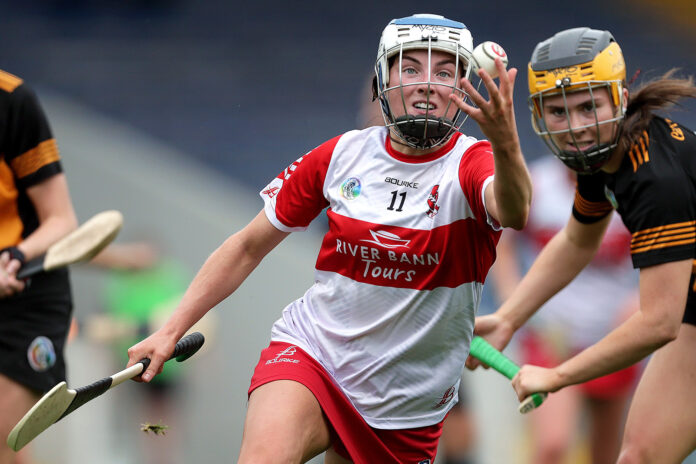
By Daragh Ó Conchúir
The year has already been a winner for Áine McAllister, following her wedding to Jack Barton, son of Derry footballing legend Damian. If she were to climb the Hogan Stand steps on Sunday with her long-time ally, friend and fellow joint-captain Aoife Ní Chaiside to collect the Jack McGrath Cup on behalf of the Oak Leaf County however, it would be some cherry on top.
Derry play Meath in the Glen Dimplex All-Ireland Intermediate Camogie Championship final at Croke Park (2.45pm throw-in, live on RTÉ2), their first appearance in the decider since the triumph of 2012, when the two skippers were bairns among a different crop of seasoned campaigners.
Now, they are Gráinne and Méabh McGoldrick, Karen Kielt. Whereas Ní Chaiside provides her inspiration in defence, it is at the other end of the field McAllister does her stuff, scoring eight points, five of which came from play, as Derry pulled away from Kilkenny in extra time of their semi-final after being on the brink of blowing it in the final quarter of normal time.
Ní Chaiside is the only survivor from 11 years ago, when Derry won the All-Ireland in a replay against Galway at the Donaghmore Ashbourne grounds by a point after drawing the first game at Croke Park, came flooding back after that game. McAllister joined the panel for the senior campaign, aged just 17.
“I had just began playing county senior and coming in at that stage, everything is just so exciting and standards are set so high you’re expecting a lot of things,” McAllister reflects.
“Playing against the likes of Cork first at senior, and Ashling Thompson. I remember it so well, making that step into senior camogie you’re a bit starstruck! Upon reflection, it didn’t do me any harm because I got exposure to the highest standard.
“But when for different reasons our older players weren’t able to commit, were starting families and so on and with girls in sport you have a lot more factors come into place in comparison to men.
“We went through a few tough years of rebuilding and starting from the ground up again in terms of getting players out and the commitment there that you would have wanted. But I just didn’t think it would take as long as it has and I would be 28 by the time I’d play at Croke Park.”
The bar has been raised in a number of areas, McAllister notes.
“Management have their heads screwed on and the correct backroom team, but also we have the full backing of the county board and having full access to things we didn’t have in previous years like video analysis. Any small margin at all helps.”
The ultimate improvement is in the players but those margins aid that process. The introduction of the aforementioned video analysis by PJ O’Mullan has facilitated the necessary self-awareness that dispenses with excuses and focuses on reasons. Last year’s semi-final defeat by Cork having led going into injury time is a case in point.
“It was a touchy subject as you could imagine but we’ve reflected on it and with new management coming in, they see where we were going wrong and how to correct the amount of mistakes that were made in that match.
“I think video analysis is good in that sense. It’s very easy after the heat of a match to put the blame on the likes of a decision by a referee but really when you sit down and look at it there’s a lot more to it. Six or seven occasions where we made the wrong decisions. We missed eight or nine shots in the first 15 minutes and in an All-Ireland semi-final you can’t afford to be missing that.
“But then it’s about how you react to (being given) that (information). You can either take the hump, which you don’t want anyone to do, or learn from it and I think that’s something we’ve done as a panel this year and will continue to do in the final.”
O’Mullan’s insistence on collaborating with club managers as well as ladies football set-ups has a major factor in a greater availability of players too according to McAllister, who played both codes for Derry for a few years before returning her focus at county level to camogie.
“PJ had a very refreshing view on it. He let the club managements know he’s working alongside them, not a case of two people working against each other. That we all want the best for the players and player welfare and it’s definitely something I feel that’s been managed fantastically this year.
“There’s never been a year before where I didn’t feel overwhelmed by the amount of load that you have. We have a number of dual players and that’s been managed really well this year and hopefully that will be appealing to younger girls and girls willing to make that step up.”
McAllister celebrated her 28th birthday lately and appears to be at the peak of her considerable powers. The teacher at the Holy Family Primary School in Magherafelt feels Derry are in a good position to repeat the feats of Down and Antrim in maintaining their senior status if they make the step up but knows that Meath represent a considerable challenge.
“We came up against them in the League this year and they turned us over. We’ve done a lot of reflection on that but Meath will bring a lot of physicality and that’s something they topped us on last year but I think we’re able to match them there a lot better this year.
“In the semi-final, things looked to be going against us when Kilkenny went a point back up before Aoife (Shaw) was able to equalise and bring us to extra time. For us to score nine points from play in extra time out of ten, showed the potential that’s in the team, the character in the side, the strength of our panel and our good conditioning so it’s about us showcasing that. I’ve no doubt it’ll be a great game and I’m really looking forward to it.”










